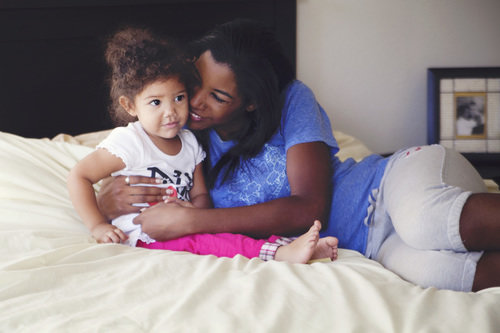Nothing can prepare you for the day your daughter tells you she doesn’t love you. Since before she was born, I did everything I could to avoid this day. I gave her a beautiful name, breastfed her, and continue to give her all of the love, attention, and cuddles she desires.
I thought maybe some day (maybe when she’s 14 or 15), we’d get into a tiff. And she’d get so angry with me because I wouldn’t let her pierce her naval.
“It’s my body!” she’d scream at me with tears in her eyes. She’d turn on her heels and run to her room feeling defeated and full of anger.
I’d walk in after her and she’d look at me with eyes full of resentment. But before she could say something she didn’t mean, I’d sit next to her, scoop her up, tell her I love her, and she’d remember all I’ve done for her, how I’m only trying to look out for her, and she’d forgive me. “I love you mom!” she’d tell me.
Even in my vivid foreshadowing of teenager arguments, I couldn’t picture my child telling me she didn’t love me. It’s just too painful to conjure up. So imagine my surprise when my 3-year-old blurted out those words like it was nothing.

As I picked her up from the babysitter’s house, my daughter was giving some resistance. She was having so much fun with her friends and didn’t want to leave. She told me she wanted to tell me something.
Eager to hear her little secret, I bent down with my hand cupped to my ear. With a smile on her face, she tip-toed to me and said, “I don’t love you mommy.”
I felt like she had hit me. How could she say that? Does she really feel that way? I never thought this day would come and here it was, no argument about belly-button rings, just a disagreement about not wanting to leave the babysitter’s.
I cried about it for a couple hours, and my husband consoled me. Turns out dads can be good reality-checkers.
Now that I’ve lived through my first punch to the parental stomach, I’ve realized a few things you can do to soften the blow if you find yourself a victim of your child’s ‘I don’t love you’ abuse.
- Stay calm. In most cases, they don’t really mean it. He’s just trying to express his feelings. Chances are he just couldn’t find the exact words to explain himself.
- Ask your child her definition of “love.” Sometimes asking why she feels that way or what she thinks that means proves that her understanding of love is different than yours.
- Tell him how that makes you feel. Explaining that those words disappoint and hurt your feelings can help him understand the impact of his words.
- If you use the word ‘hate,’ your kids probably will too. In my case this could be the only thing my daughter could have said to make me feel worse. But often kids are only repeating what they hear from friends or at home. “I hate laundry” or “I hate spiders” could quickly turn into “I hate you” from a preschooler.
- Avoid the urge to hurt back. It’s natural to want to snap back when someone hurts you, but one of the worst things you could do is retaliate with harsh words. Talk about how you both are feeling sans “I don’t love you either.”
More from The Stir: 10 Things Your Toddler Tells You & What He REALLY Means
After lots of "I’m sorry"s, "I do love you mommy"s, and a month or two of sulking, I’ve recovered and I’m hopeful she won’t be saying anything like that again. At least not until she’s a teenager begging me for piercings.




